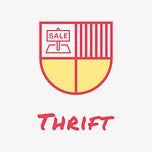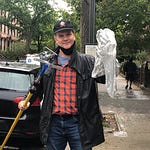Full episodes are available to everyone through Apple Podcasts on Thursdays. Paid subscribers get early access to new episodes right here on Substack. Interested in becoming a paid subscriber? You can read more about the perks here.
Episode show notes
Credits
Host: Maggie Blaha
Theme music: “Thanks for the Memory” written by Leo Robin and Ralph Rainger, performed by Bob Hope and Shirley Ross in the 1938 film of the same name
Background music: Night In Venice by Kevin MacLeod
Link: https://incompetech.filmmusic.io/song/5763-night-in-venice
License: http://creativecommons.org/licenses/by/4.0/
In this episode, Maggie once again talks with David and Celeste of Dial V for Vintage. This time, they discuss what it’s like to be collectors and what it takes to feed that obsession. From finding unique ways to display all their collections to their strategy for visiting thrift stores and vintage shops, this episode should help you understand how you, too, can become a collector.
Check out the Dial V for Vintage store, or follow them on Instagram.
You can also listen to episode 15 again to hear how David and Celeste launched their store during the pandemic.
You can find Thrift: What Your Garage Sale Says About You in a few different places on the internet. Choose how you want to follow and engage with us:
Instagram: @thriftpodcast
Facebook: @thriftpodcast
And please be sure to rate and subscribe to the podcast on Apple Podcasts, which will help other people find Thrift.
The online thrift shop is slowly coming along, which you can visit on Poshmark at the handle @thrift_podcast. For more updates, you can follow the store on Facebook @thriftpodcastshop and Instagram @thriftpodcaststore.
Episode transcript
OPENING
Maggie: That’s awesome! So, can I ask about the elephants in the background there?
Celeste: Yeah, we love pink elephants.
David: We’ve been collecting pink elephants for years—
Celeste: Forever.
David: I just love the idea that in the 1950s a pink elephant represented getting drunk and having cocktails, and it’s just a fantastic little icon of the time.
Celeste: So that’s our bar!
INTRODUCTION
Maggie: You’re listening to Thrift: What Your Garage Sale Says About You, a podcast that explores how we can all be more community-minded citizens through thrifting.
[THEME MUSIC, 30 SECONDS]
[CLIP BEGINS]
Maggie: So you have lots of different collections then?
Celeste: Oh my gosh, yes. It’s probably easier to say what we don’t collect. Oh my god. I feel like we collect a little bit of everything. Do you really want me to go through all of this? Do you have time for this?
[CLIP ENDS]
Maggie: That was Celeste of Dial V for Vintage, asking if I really wanted her to list all the collections she and her husband David have built over the years. And I’m Maggie Blaha, the host of this podcast as always.
If you listened to episode 16, the second episode released this season, you’ll remember hearing about how David and Celeste managed to launch their online vintage store during a pandemic. But I wanted to have a separate episode where David and Celeste could really nerd out about their passion: collecting.
When it comes to thrifting, antiquing, secondhand shopping in general, I’ll admit that I’m a novice. Sure, I love casually browsing through vintage shops and happily stumbling upon something I’ll probably never actually need, but I’m not driven to go hunting. The ‘thrill of the hunt’ is something I’ve heard David, Celeste, and other collectors talk about. I just don’t think I can commit to the life of a collector.
I have commitment issues generally, especially when it comes to sticking to one project or focusing on and really developing just one of my interests. Could I actually commit to completing or trying to complete a collection? Would the search to find all the items I need for the said collection thrill me?
And what sort of collection would I even start? I actually have a few gnome statues—could I collect gnomes? I have 1 typewriter, and I suppose I could add more. Books would probably make the most sense, given that I have so many, but all the books I own aren’t exactly vintage. Plus, antiquarian books tend to be out of my price range.
David and Celeste walked me through some of their own collections.
[CLIP BEGINS]
David: All right, well I like circus stuff, and circus stuff is extremely hard to find anymore. So I’m in a pickle with those because that stuff is impossible to find, but we just love everything—
Celeste: We just love everything from mid-century— I have a lot of pinup-related paraphernalia because of my business.
Maggie: How does a collection start, and when does it turn into an obsession? Would you say that it’s an obsession at this point?
Celeste: Oh, 100% it’s an obsession.
David: I find myself buying stuff not because I’m into it per se, but I’m like I need to get this because I already have a few things and it’s in front of me now. And I don’t know when I’ll see it again, so if I don’t buy it I’m in trouble. A part of my brain just won’t let me walk away from it.
It’s just like, I don’t know, something sparks. You’re walking in a flea market and there’s just this certain aesthetic to something—
Celeste: Yeah, it catches your eye.
David: And once you get rolling with it, then you’re— It’s almost like a game where you’re like, I need to find this. When you find it it’s like hitting the jackpot on a slot machine. Like you play forever, and then once you hit it you’re like, OK, now I’m addicted. I want to hit it again.
Celeste: And I also feel like sometimes, moreso lately, that I’ll find one thing that I love. I don’t know, we’ve been finding some really cool mid-century lamps lately, television ones. And I would buy one, and then all of a sudden the next week I’d find another one, and then another one. And it’s almost like you bought the one, and you put it out in the universe, and the universe just brought all of them to you.
And then you’re like, OK, well now I have to start collecting these, because I don’t ever see them but for some reason now that I bought one I’m seeing them all the time. So I feel like it’s that way sometimes, too.
David: Well, you don’t have to buy them—
Celeste: I don’t have to buy them. But, you know, if it’s a good price, I can’t leave it.
Maggie: And then do you start to learn more about the stuff you’re collecting until you’re almost experts? Is that how it works?
David: I think so. I think there’s stuff that we know now that we didn’t know maybe 5 or 10 years ago.
[CLIP ENDS]
Maggie: So it sounds like collecting is a kind of addiction, and you have to embrace it in order to be good at it. It doesn’t sound like it’s particularly detrimental to your health—maybe just your wallet. And I imagine finding a place to store your collection could become a nightmare.
In my Brooklyn apartment, I would say that most of my space is accounted for. There’s no more room under my bed, in my closet, on my shelves. My book obsession has resulted in my building towers from the floor up against a wall in my bedroom.
How do David and Celeste find room for everything?
[CLIP BEGINS]
Celeste: We started our shop Dial V for Vintage pretty recently. We’re both artists. So I’ve been a photographer, I started my business about 17 years ago, and really before that is when I started collecting.
My business is vintage portraiture, so mainly I take pictures of women as 1950s pinups. That’s how I really started collecting a lot of the items, and that’s really what led us to start Dial V for Vintage. Plus, we’re just huge collectors.
David: We accumulated more stuff than we could keep, so we decided to share that with other people. We’ve definitely been running out of space, but we love buying so it was inevitable. And we talked to a lot of older dealers who were like, yeah, that’s how we got started. We just love buying and to fuel that buying, you have to sell stuff at a certain point.
[CLIP ENDS]
Maggie: I want to reflect on the last thing David said for a moment: “To fuel that buying, you have to sell stuff at a certain point.” I take that to mean that you really shouldn’t become too attached to anything you buy. Everything has a moment in your life, and you need to know when it’s time to let go.
This is something I’ve been working through when picking out items to sell in my online thrift store. With clothes it’s pretty simple—I just get rid of anything I haven’t worn in a while and don’t plan on wearing. But other items just don’t have that practical, utilitarian purpose. It comes down to knowing that an object’s life with you is over, and that it’s time to make space for new things in your life. I feel like the stuff we let go of can say a lot about us. Possibly more than the stuff we keep.
I will say that I’m definitely at odds with Celeste and David about how easy it is to give up books. Not sure what that says about me.
[CLIP BEGINS]
Maggie: What kind of stuff is it easy for you both to let go of?
Celeste: Books. Some books. It was finally time for us to decide what books we really loved and were going to display or read, and what ones we could let other people enjoy.
David: They were sitting in boxes. We had really nice vintage bird books and garden books—
Celeste: Some really nice antique books.
David: Yeah, antique books. It’s just better to have someone else enjoy them.
[CLIP ENDS]
Maggie: This concept of letting other people enjoy your pre-loved stuff that always comes up...am I just selfish when it comes to books?
Not that I have the same volume of stuff as David and Celeste, but I do sympathize with having to find creative ways to display certain possessions. For me, it’s books. For them...well...I asked them about all the typewriters they were posting pictures of on their Instagram page.
[CLIP BEGINS]
David: Typewriters seem to find us, because they’re heavy and I don’t need any. But I am attracted to the old technology and the look of them—
Celeste: And they’re great display pieces.
David: We actually took our typewriters and hung them on a wall, because a lot of the old typewriters, the portable ones, would have a hook on the back that allowed them to sit inside their case nicely. But nobody’s ever thought, oh, I can use that hook to hang them on a wall, and I think they display really nicely.
Celeste: And we were running out of space, so we had to figure out a new way to display them.
[CLIP ENDS]
Maggie: If you remember back to episode 9—Our Clutter, Ourselves—when I interviewed professional organizer Francesco Pirredu, he said that as long as you can find creative ways to display your stuff, you’re fine. That’s definitely not exactly what he said, but I think I’ve captured the gist.
So, how challenging and thrilling is the hunt that David and Celeste often go on?
[CLIP BEGINS]
David: Finding stuff is just running around. Thrift stores, flea markets, auctions—
Celeste: Estate sales—
David: Estate sales. It’s a lot of—
Celeste: Trash picking.
David: It’s a lot of pounding the pavement and just knowing that some days you’re going to completely strike out and not find anything, and other days you’re going to fill your car.
Maggie: How much time do you put into the hunt?
Celeste: Oh my gosh, a lot! I’d say we’re probably shopping 3 full days. It depends on whether or not there are great sales for us to hit from week to week.
Maggie: Do you bring people with you?
Celeste: No.
David: We tried to bring her mom with us once, and she just wasn’t fast enough for us. We were like, we’ve got seven other stores we need to hit, we’ve gotta go!
Celeste: We definitely have a math of how we handle it all.
David: We’ve been together for over 20 years now, so we totally work on the same level. But you bring somebody else and they look at us like we’re weirdos.
Maggie: What’s the criteria for what you pick up? Does it have to count as vintage?
David: It’s funny you say that because I’m confused about what vintage is now. Somebody has recently bought some 80s vases, and I was like, what are you doing? But 80s, that’s like 50 years old now. But that’s vintage to people. Songs that I grew up to are now playing on the oldies station.
Vintage can be, I would think, anything prior to the 90s. We like the look and aesthetic of mid-century, but there’s definitely people who consider the 80s very vintage.
Celeste: We typically buy things, I would say, from the 40s, 50s, 60s, and 70s. And once in a while, just because we’re children of the 80s, we’ll grab that super-cool E.T. tray, you know, just something for nostalgia.
[CLIP ENDS]
Maggie: Thrifting is relatively new for me. I didn’t really do it when I was younger. Maybe that’s why I lack a certain drive and passion for it that other guests on the podcast seem to have. Brooke from an earlier episode this season remembers attending yard sales with her mom. Jess Master of Miss Master’s Closet always hit up The Salvation Army as a teen. And David and Celeste have been thrifting for forever, as well.
[CLIP BEGINS]
Celeste: My mom is a big collector as well, and we used to go to antique malls definitely. I guess I started thrifting really in high school, because I loved to buy vintage clothes and accessories and wear them… I think I got it from my mom.
David: So you were shopping in antique stores, I was from the other side of the tracks. I was shopping in Salvation Army—
Celeste: I was there, too!
David: I grew up an alternative kid.
[CLIP ENDS]
Maggie: To recap, let’s go over what you’ll need to consider if you want to become a collector:
1. Find your passion, get obsessed with it
2. You’ll need some space to store or display your collection
3. You’ll need to find a way to fuel your passion for buying, like opening an online store to sell stuff you’re ready to part with
4. You’ll need to put in the time and effort to find stuff for your collection, and you have to be ready to accept that all that time and effort might turn up nothing
5. Finally, you’ll have to set some standards for what you spend your money on; you can’t just buy everything that might be a good fit for your collection
If you want to hear or read more from Thrift, there are a few places you can find the podcast on the internet.
On Facebook and Instagram, we’re @thriftpodcast. You can also follow the online thrift store on Instagram @thriftpodcaststore, or Facebook @thriftpodcastshop. We’ve also got a newsletter, which you can find at https://thriftpodcast.substack.com.
That concludes another episode of Thrift: What Your Garage Sale Says About You. Thanks for listening!
[OUTRO, 30 SECONDS]














Share this post